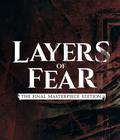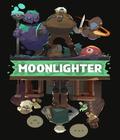Moonlighter wears its influences on its sleeve — there's a lot of A Link to the Past in this game's DNA — and this feels like a side story for one of them. In a world where civilization is mostly a bunch of unconnected villages in a medieval world, where's the general store owner getting all his inventory? As it turns out, he's off having his own adventures while you aren't looking.
Decades ago, an archeological expedition discovered the Gates: a set of doors inside an ancient ruin, which lead people to a seemingly random and infinite number of alternate realms and dimensions. Adventurers showed up to explore the Gates, and shortly thereafter, the city of Rynoka grew up to provide the adventurers with needed services.
The oldest shop in Rynoka is called Moonlighter, and since Will's grandfather passed away, he owns it. By night, he explores the Gates himself, in search of treasures; by day, he sells those treasures to the local adventurer population to generate the money he needs to venture further into the dungeons.
When I first played Moonlighter at E3, it struck me as a fairly flagrant Zelda homage. When you enter one of the Gates, you walk into a dungeon full of one-screen rooms, deadly monsters, traps, pots that need smashing, and very occasionally, a treasure chest. While Will has a few tricks up his sleeve that Link never did, like an evasion roll that has a long invincibility window, it all feels comfortably familiar.
Since the Moonlighter crew's idea of "E3 swag" is a Steam code for the current alpha build (note to developers: more of you should do this), I've had the chance to play it at a quieter pace, and I've come to the conclusion that this is a trap. Moonlighter, once you get past the tutorial section (which includes an unavoidable death, just in case you thought this was a game that dealt in mercy), turns into a punishingly difficult endurance test of a game. It hearkens back to SNES action-RPGs; specifically, to that moment when you walked into a dungeon unprepared, got thrashed by the first few rooms' monsters, and now you're limping through the place on your last bit of life, hoping to find a healing item somewhere if only to make that beeping sound stop. That's what Moonlighter feels like all the time.
The dungeons in the Gates are procedurally generated, so they'll never be the same twice. At the end of your first crawl, you find a magical necklace that lets you teleport back to Rynoka at will; it costs money to do so, but it also gives you the option to lock a particular dungeon in place, allowing you to return later on. This comes in handy because Will only has so many inventory slots, and being able to head home to drop off some junk is crucial, all the more so because he'll lose most of his inventory if he dies. I may have brought up A Link to the Past before, but that's just the graphics. When you really start to crack into Moonlighter, it's a colorfully dressed roguelike, and it wants you dead.
The various items you acquire over the course of a dungeon run, such as monster bits, crafting ingredients, random sticks, and pieces of ore, can be sold at your shop to Rynoka's adventuring population, although you'll need to figure out the ideal price points. You can also use the materials and a boatload of money to craft badly needed upgrades for your basic gear. It's a balancing act between soaking the adventurers for all they're worth, or saving the good stuff to build yourself a new weapon.
Moonlighter is difficult enough that I don't feel like I have a handle on it yet. Upgrades are expensive, I haven't gotten a reliable supply of the only items that seem to sell for decent cash, and just now, I was eaten by a giant green snot monster for, as far as I can tell, the temerity of sticking around to open the treasure chest I just unlocked. I feel like it's out to get me.
The retro appeal may have gotten your attention here, but it's sometimes useful to remember that the flip side of old games was that many of them were challenging to the point of lunacy, and that's the experience Moonlighter is mining. It's a clever upgrade to the 16-bit era.
More articles about Moonlighter













 Moonlighter is a 2D action/RPG with rogue-lite elements following the everyday routines of the aforementioned Will, Rynoka’s ambitious shopkeeper that dreams of becoming a hero.
Moonlighter is a 2D action/RPG with rogue-lite elements following the everyday routines of the aforementioned Will, Rynoka’s ambitious shopkeeper that dreams of becoming a hero.













